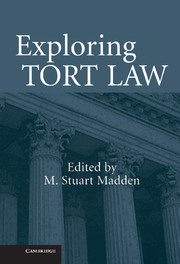Book contents
- Frontmatter
- Contents
- Contributors
- Preface
- INTRODUCTION
- SECTION I TORT LAW IN THE NEW MILLENNIUM: PAST AS PROLOGUE
- SECTION II COMPENSATION AND DETERRENCE IN THE MODERN WORLD
- SECTION III DUTY RULES, COURTS, AND TORTS
- 5 THE DISINTEGRATION OF DUTY
- 6 MANAGING THE NEGLIGENCE CONCEPT: RESPECT FOR THE RULE OF LAW
- 7 REBUILDING THE CITADEL: PRIVITY, CAUSATION, AND FREEDOM OF CONTRACT
- 8 CONTROLLING THE FUTURE OF THE COMMON LAW BY RESTATEMENT
- 9 INFORMATION SHIELDS IN TORT LAW
- 10 THE COMPLEXITY OF TORTS – THE CASE OF PUNITIVE DAMAGES
- 11 THE FUTURE OF PROPORTIONAL LIABILITY: THE LESSONS OF TOXIC SUBSTANCES CAUSATION
- SECTION IV TORTS IN A SHRINKING WORLD
- Index
10 - THE COMPLEXITY OF TORTS – THE CASE OF PUNITIVE DAMAGES
Published online by Cambridge University Press: 05 June 2012
- Frontmatter
- Contents
- Contributors
- Preface
- INTRODUCTION
- SECTION I TORT LAW IN THE NEW MILLENNIUM: PAST AS PROLOGUE
- SECTION II COMPENSATION AND DETERRENCE IN THE MODERN WORLD
- SECTION III DUTY RULES, COURTS, AND TORTS
- 5 THE DISINTEGRATION OF DUTY
- 6 MANAGING THE NEGLIGENCE CONCEPT: RESPECT FOR THE RULE OF LAW
- 7 REBUILDING THE CITADEL: PRIVITY, CAUSATION, AND FREEDOM OF CONTRACT
- 8 CONTROLLING THE FUTURE OF THE COMMON LAW BY RESTATEMENT
- 9 INFORMATION SHIELDS IN TORT LAW
- 10 THE COMPLEXITY OF TORTS – THE CASE OF PUNITIVE DAMAGES
- 11 THE FUTURE OF PROPORTIONAL LIABILITY: THE LESSONS OF TOXIC SUBSTANCES CAUSATION
- SECTION IV TORTS IN A SHRINKING WORLD
- Index
Summary
abstract. Law, and particularly tort law, serves definable human goals. Often these goals are multidimensional, and too often, those who view tort law in a goal-oriented way move quickly to a single, simple goal – whether it be economic efficiency, furthering loss spreading or anything else – and, having examined tort doctrines and cases on that basis, are properly attacked for being reductionists. The thesis of this chapter is that the pursuit of one-dimensional goals in tort law is fraught with such risks.
Generally speaking, courts are unlikely to be reductionist. Judges derive law from many sources. The problem arises from the ever-increasing incursions by federal courts into the tort process, and is worsened when the incursion is by the Supreme Court. This chapter concentrates on punitive damages. Its thesis is that punitive damages in tort law can perform at least five very different functions, and that each is a sufficient reason for a state to seek to impose exemplary awards. These objectives may reveal or include a desire to: (1) enforce societal norms, through the use of private attorney's general; (2) employ “the multiplier,” in the sense that the proper size of the deterrent assessed on those one would deter is not the harm to any one victim but rather that harm multiplied by all those victims whose harms are not likely to be charged to the injurer; (3) the “Tragic Choice” Function, such as in the Pinto case; (4) permit Recovery of Generally Nonrecoverable Compensatory Damages; and (5) permit Righting of Private Wrongs.
Information
- Type
- Chapter
- Information
- Exploring Tort Law , pp. 333 - 351Publisher: Cambridge University PressPrint publication year: 2005
Accessibility standard: Unknown
- 2
- Cited by
